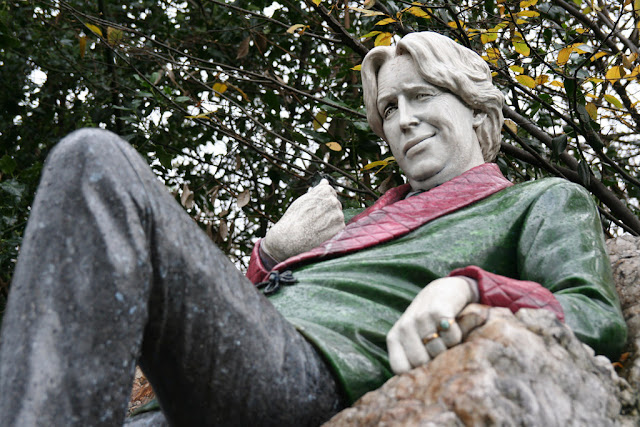Queering the Trad Session: A Postcard from Dublin
Staggering through Monkstown village around 2AM with one of my closest friends, a weekend jaunt to Dublin having propelled us to this point, I obsess about this singer. I have heard men sing love ballads with "he" pronouns, and women with "she", but always in a way that says "I am secure enough in my heterosexuality to leave these things unchanged". In all of the folk clubs and sessions I've ever been to, I have never seen such conclusive evidence that I'm not the only queer person in the room.
Piper's Corner, Dublin.
What set it apart is hard to pin down. Something about his aspect, and the reactions of the musicians around him? His sweet, high tenor? The movements of his body? The way he emphasises "my William"? Perhaps it's in the choice of song itself, the emigration ballad "North Amerikay". Its combination of unsettling allusions to a "father's anger" and the impossibly extra notion of tracking down a lover the other side of the Atlantic certainly lend themselves to queer interpretation:
Ye lovers all both great and small, who dwell in Ireland
Oh I pray you pay attention, whilst I my pen command
It was my father's anger that drove my love away
But I still have hopes we'll meet again in North Amerikay
My love he was fair and handsome and to him I gave my heart
Ah but little was our notion that we would ever part
It was in my father's garden, that this flower it did decay
But I still have hopes t'wil' bloom again, in North Amerikay
Now I did not want for money, kind fortune on me shone
So out of my father's castle I took 300 pounds
It was in the town of Belfast, my passage I did pay
And then set sail across the sea to far Amerikay
Now the captain's wife was kind to me, as you may understand
And she kept me in her cabin until we reached dry land
It was in the town of Quebec we landed on the Cay
But I knew not where to seek my love in all Amerikay
Now I being sick and sore and tired, well I went into an inn
And it was there I met my William, the lad I loved, within
He took me gently by the hand and to me he did say
Oh I never thought I'd see your face in North Amerikay
Now I hear this couple have got wed as you may understand
And I hear they live quite happily in a town they call Saint Johns
And the money that she took from home, well in gold she paid it down
And they think no more of Ireland nor Enniskillin Town
Camp traditions of referring to one another as "she" notwithstanding, the shift in person for the final verse, from first to third, distances the happy ending. It places it into another mouth: we hear a queer man telling us about someone else's happy wedding after all. Ireland legalised gay marriage in 2015--an event that was, incidentally, made much of in the Museum of Irish Emigration that we visited the day before this video (to the sound of roaring silence on abortion law). Nevertheless, the Irish government only decriminalised "same-sex sexual activity" in 1993, and our weekend of museum-going, sight-seeing, and pub-going was disrupted by small incidents of homophobia. My friend is straight, but we're often read as a couple. I'm small with a boyish face, he's tall and wears a lot of velvet; we both give off a bit of Brideshead campness. It's really the only explanation for a bartender turning us away at lunchtime because he "didn't like the look" of us. The night before I took that video, in the same pub, a guy who we'd been chatting to--with a grin plastered over his face--jovially called me a faggot. I had been meaning to get a silly photo with the Oscar Wilde memorial statue, but with the taste of these incidents lingering in my mouth, I mind less that we didn't get around to it.
Ireland is, of course, postcolonial. I have lived with the benefits of British colonialism's legacy every day of my life. And while there's a wealth of writing about homophobia as a colonial import in the global South, the situation is much messier in Ireland's case, tangled in both Catholic and protestant doctrines. But at the same time, the idea that a country that's been through so much violence is left with less energy for social justice is a fairly straightforward one, and Ashis Nandy has written of the hypermasculinity of nationalism as a response to the emasculating violence of being a colonial subject. These painful residues scatter themselves across the city: sure, they're at the General Post Office, Kilmainham Gaol, and the sites of former barricades, but they're also in the pubs, on the street, and in the people.
Moments of queer listening like this remind me of something Hector says to Posner in History Boys: "it's as if a hand has come out, and taken yours". But while this brief moment of connection is beautiful, I am still a tourist, and will soon go home.









Comments
Post a Comment